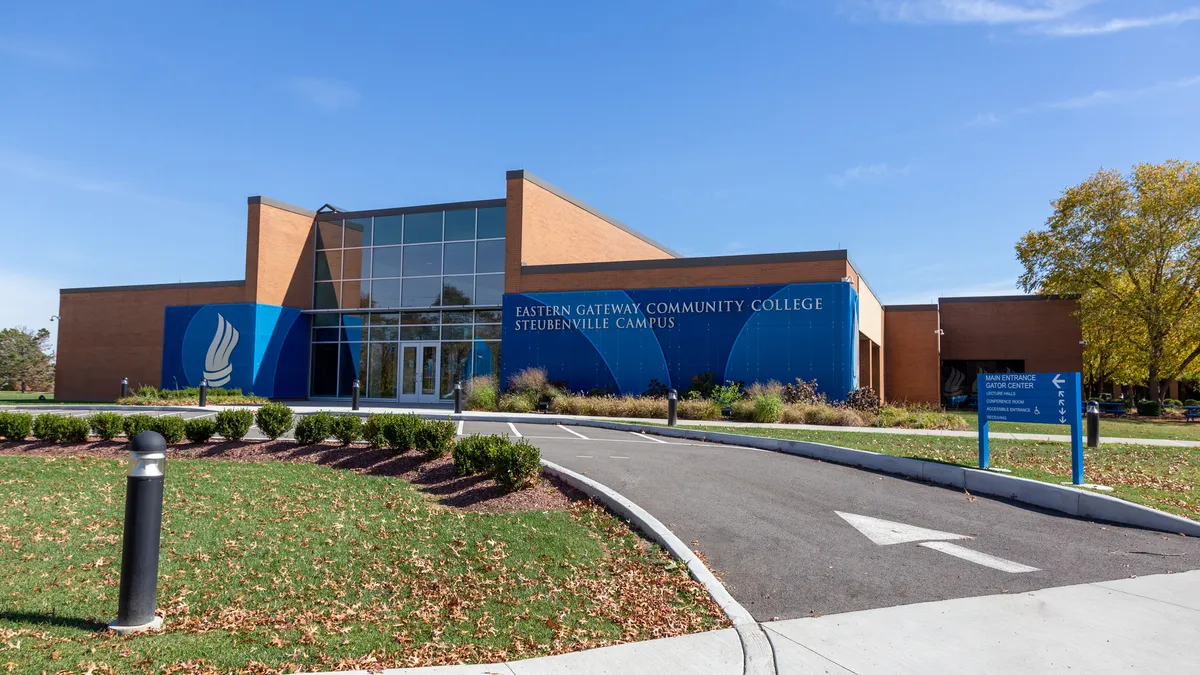Dive Brief:
- Eastern Gateway Community College sued the U.S. Department of Education in federal court Friday, alleging regulators overstepped their legal authority, violated due process and imperiled the institution's future by telling it to stop offering a free college program.
- The Education Department's actions "create certain and imminent financial losses so severe" that they threaten Eastern Gateway's operations, according to the lawsuit, filed in U.S. District Court for the Southern District of Ohio.
- Eastern Gateway is asking for a jury trial and a declaration that several Education Department actions were unlawful. Those actions include regulators sending a cease-and-desist letter telling Eastern Gateway to stop enrolling new students in its free college program, restricting how it receives federal financial aid dollars, and requiring a teach-out agreement that the lawsuit argues effectively requires students to transfer to other institutions. The lawsuit also seeks damages and attorneys' fees.
Dive Insight:
Friday's lawsuit escalates a multiweek battle at the intersection of free college programs, institutions' financial aid practices and regulations governing federal aid like the Pell Grant, which generally funds low-income students' college costs.
For seven years, Eastern Gateway, which has campuses in Steubenville and Youngstown, Ohio, has operated a Free College Benefit Program for students affiliated with labor unions. The community college characterizes the program as a last-dollar scholarship that pays the remaining tuition for a student after other financial aid has been applied. The program has fueled massive growth at Eastern Gateway, which today enrolls some 30,000 students versus about 4,800 in 2015-16.
In July, the Education Department intervened in the program, arguing it charges students who receive Pell funding more than it charges students who do not — a violation of federal law. Under the program, both students who receive Pell Grants and those who do not see their remaining bills zeroed out, according to a letter the department sent Eastern Gateway. But regulators found little scholarship funding coming from outside the college, which they said leaves the federal government paying bills for Pell Grant recipients even as no one pays for other students.
Eastern Gateway disagreed with those characterizations. But it suspended new enrollment in the free college program in July.
The Education Department then placed the college on the Heightened Cash Monitoring 2 list. That list, known as HCM2, prevents colleges from drawing on federal financial aid funds upfront and instead requires them to use institutional resources to credit students with financial aid before requesting the federal government reimburse them later.
Eastern Gateway asked the Education Department how it can overhaul the program or meet federal financial aid standards, according to Friday's lawsuit. But the department refused to respond to a proposed redesign of the free college program, grant a regulatory appeal hearing or answer follow-up questions, the lawsuit says.
It also accused the Education Department of requiring Eastern Gateway to enter into a teach-out agreement within 30 days that would effectively force students to transfer from the college to complete their academic programs.
An Aug. 10 letter from the Education Department, which Eastern Gateway included in materials with its lawsuit, says the teach-out agreement is intended to "assist students if they are unable to finish their programs of study."
About 30,000 students were enrolled in the Free College Benefit Program for the summer or fall terms. Access to federal financial aid is important for Eastern Gateway, which draws 74.5% of its total revenue from Pell Grants, according to the lawsuit.
The Education Department has not released the review of the program that led to its enforcement steps, Eastern Gateway's president, Michael Geoghegan, said in a statement.
"In order to preserve access to education for our students, we had to take this legal action," Geoghegan said. "We are optimistic that the court will agree that there is a better and more equitable way to address the concerns expressed by ED officials and help us maintain access to higher education for our students."
The Education Department declined comment on the pending litigation.
Eastern Gateway's lawsuit argues the college charges all students in the free tuition program the same tuition and fees, regardless of whether they're eligible for federal financial aid.
It adds that the Ohio Department of Higher Education signed off on the last-dollar scholarship, approving tuition waivers of up to $3,500 for in-state students and as much as $6,000 for out-of-state students.















